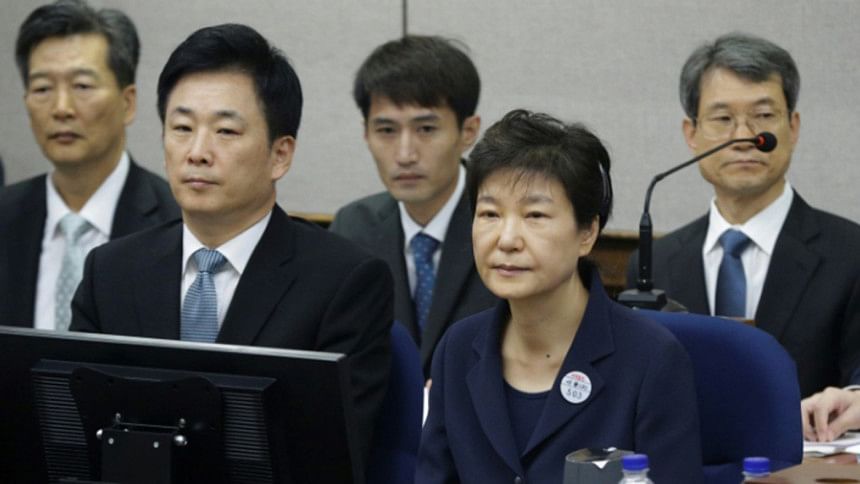Ousted South Korean leader Park goes on trial

South Korea's ousted president Park Geun-Hye, grim-faced and brought to court in handcuffs, went on trial Tuesday over a sprawling corruption scandal that saw millions take to the streets and led to her downfall.
Only two months after leaving the presidential palace in disgrace, Park was brought to the Seoul Central District Court in handcuffs on a justice ministry bus, with at least six guards on board.
She wore a blue trouser suit, a badge with her prisoner number, and no make-up in court, where she avoided meeting the glance of her longtime secret confidante and co-accused Choi Soon-Sil.
The trial, expected to last for months, is the final act in the drama that engulfed Park, the daughter of a dictator who went on to be elected president herself before she was sacked by the country's top court.
Presiding judge Kim Se-Yun, who heads a three-man panel -- there is no jury -- asked her: "What is your occupation, the accused Park Geun-Hye?"
She responded: "I don't have any occupation."
Park, 65, is the third former South Korean leader to stand trial for corruption.
She was impeached by parliament in December after mass demonstrations -- that built on economic and social frustrations -- to demand her removal over a scandal centred on Choi, her friend of 40 years, and implicating some of the country's top businessmen.
She was detained soon after her dismissal -- Tuesday's court session was her first public appearance since then -- and indicted on 18 charges including bribery, coercion and abuse of power for offering governmental favours to tycoons who bribed Choi.
Cosy ties
Cosy and corrupt ties between South Korea's business and political elites have endured for decades and the trial could shed new light on the links between Park and the bosses of the family-run conglomerates that dominate Asia's fourth-biggest economy.
They include Samsung heir Lee Jae-Yong, who is being tried separately, and Shin Dong-Bin, the chairman of retail giant Lotte, the South's fifth-biggest conglomerate, who was among the accused Tuesday.
Choi, the daughter of a shadowy religious figure who was Park's mentor for years, is similarly accused of using her presidential ties to force top firms to "donate" nearly $70 million to non-profit foundations which she then used for personal gain.
Prosecutors told the court that Park and Choi colluded in receiving seven billion won ($6 million) from Shin last year.
Park met Samsung's Lee in July and told him she hoped the succession at the world's biggest smartphone maker "would be resolved smoothly under her government", asking him to support the foundations, according to prosecutor Hwang Woong-Jae.
Park is also accused of letting Choi, who has no title or security clearance, handle a wide range of state affairs including senior nominations and even her daily wardrobe choices.
She denied all the charges against her, and her lawyers told the court she could not benefit personally from the foundations.
Park has previously blamed Choi for abusing their friendship.
'Chapter of history'
The proceedings took place under tight security, with a few members of the public present after winning a lottery for seats in the gallery.
"I am here to witness a new chapter of history being unfurled," spectator Lee Jae-Bong, 70, told AFP.
"I think Park must be punished thoroughly and never be pardoned so that such a bad thing may never happen again."
Former South Korean presidents Chun Doo-Hwan and Roh Tae-Woo served jail terms in the 1990s for charges including bribery and treason, and ex-president Roh Moo-Hyun -- the mentor of new leader Moon Jae-In -- killed himself in 2009 after being questioned over graft.
The hearing comes only two weeks after the country elected left-leaning former human rights lawyer Moon -- who lost the 2012 poll to Park -- as her successor.
Park Young-Soo, who led the special prosecutors who investigated the case, has said the proceedings will be "the trial of the century".
Park grew up in the presidential palace as the daughter of late dictator Park Chung-Hee, who took power in 1961, stepping in as de facto first lady after her mother was murdered in an attempt to kill him. He was assassinated in turn in 1979.
She rose to the presidency largely on the back of his continuing popularity among the aged voters who benefited from rapid economic growth under his tenure.
If convicted of the most serious charges, Park faces a minimum sentence of 10 years in jail, and a maximum of life.

 For all latest news, follow The Daily Star's Google News channel.
For all latest news, follow The Daily Star's Google News channel. 





Comments